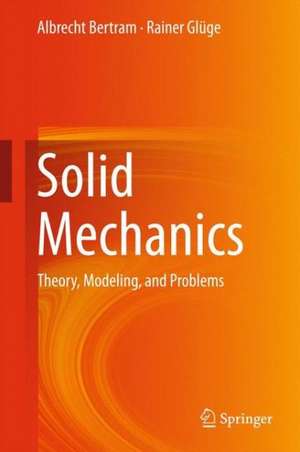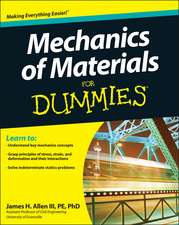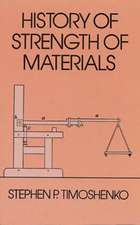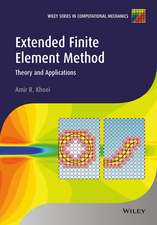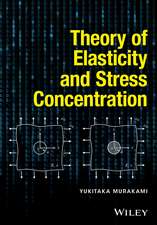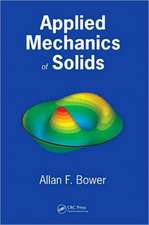Solid Mechanics: Theory, Modeling, and Problems
Autor Albrecht Bertram, Rainer Glügeen Limba Engleză Hardback – 25 iun 2015
| Toate formatele și edițiile | Preț | Express |
|---|---|---|
| Paperback (1) | 390.25 lei 6-8 săpt. | |
| Springer International Publishing – 13 oct 2016 | 390.25 lei 6-8 săpt. | |
| Hardback (1) | 397.76 lei 6-8 săpt. | |
| Springer International Publishing – 25 iun 2015 | 397.76 lei 6-8 săpt. |
Preț: 397.76 lei
Nou
Puncte Express: 597
Preț estimativ în valută:
76.14€ • 82.73$ • 63.100£
76.14€ • 82.73$ • 63.100£
Carte tipărită la comandă
Livrare economică 21 aprilie-05 mai
Preluare comenzi: 021 569.72.76
Specificații
ISBN-13: 9783319195650
ISBN-10: 3319195654
Pagini: 300
Ilustrații: XIII, 318 p. 87 illus., 1 illus. in color.
Dimensiuni: 155 x 235 x 25 mm
Greutate: 0.64 kg
Ediția:2015
Editura: Springer International Publishing
Colecția Springer
Locul publicării:Cham, Switzerland
ISBN-10: 3319195654
Pagini: 300
Ilustrații: XIII, 318 p. 87 illus., 1 illus. in color.
Dimensiuni: 155 x 235 x 25 mm
Greutate: 0.64 kg
Ediția:2015
Editura: Springer International Publishing
Colecția Springer
Locul publicării:Cham, Switzerland
Public țintă
Upper undergraduateCuprins
One-Dimensional Material Theory.- Introduction To Tensor Calculus.- Vector And Tensor Analysis.- Foundations Of Continuum Mechanics.- Three-Dimensional Material Theory.
Recenzii
“This is one of a few textbooks on mathematically modeling the physical behavior of classical materials under the mechanical effects within the linear theory of continuum mechanics, and it comprises four chapters with selected references and sample examples, and an index. … The textbook is very comprehensive, well documented to the interested reader and highly recommended to students, teachers and researchers.” (M. Cengiz Dökmeci, zbMATH, Vol. 1366.74001, 2017)
Notă biografică
Albrecht Bertram, born in 1950, is professor for engineering mechanics at the University of Magdeburg and the Technical University of Berlin. He was visiting professor at Paris Tech and the University of California in Berkeley. His field of research is continuum mechanics and in particular, material modeling (elasticity, plasticity, viscoelasticity, damage, anisotropy, micro-macro, gradient materials, etc.). He is editor of the journal Technische Mechanik and initiator of the series International Conferences on Material Modeling.
Rainer Glüge, born in 1980, is a researcher, tutor and lecturer in the field of continuum mechanics and material modeling in the same group. His research interests are the theory of composites, scale bridging methods between micro- and macro scale, material modeling of phase transitions in solids and the nonlinear theory of elasticity.
Rainer Glüge, born in 1980, is a researcher, tutor and lecturer in the field of continuum mechanics and material modeling in the same group. His research interests are the theory of composites, scale bridging methods between micro- and macro scale, material modeling of phase transitions in solids and the nonlinear theory of elasticity.
Textul de pe ultima copertă
This textbook offers an introduction to modeling the mechanical behavior of solids within continuum mechanics and thermodynamics. To illustrate the fundamental principles, the book starts with an overview of the most important models in one dimension. Tensor calculus, which is called for in three-dimensional modeling, is concisely presented in the second part of the book. Once the reader is equipped with these essential mathematical tools, the third part of the book develops the foundations of continuum mechanics right from the beginning. Lastly, the book’s fourth part focuses on modeling the mechanics of materials and in particular elasticity, viscoelasticity and plasticity. Intended as an introductory textbook for students and for professionals interested in self-study, it also features numerous worked-out examples to aid in understanding.
Caracteristici
Offers a concise introduction to the science of modeling materials Facilitates the understanding of fundamental principles by uniaxial materials modelling Includes many worked examples and homework problems and solutions can be provided to instructors Includes supplementary material: sn.pub/extras
